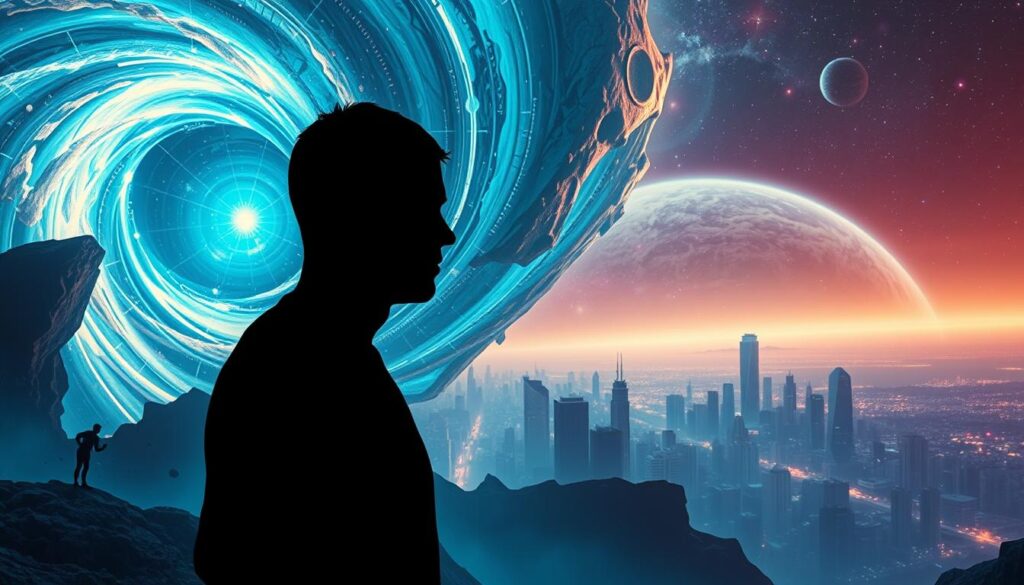Sci-fi stories often take us to far-off planets or futuristic worlds. But their real power is closer to home. Tales like Interstellar or Blade Runner show how space or time adventures can mirror our own struggles and growth. These stories aren’t just escapes—they’re mirrors, reflecting the questions we ask ourselves every day.
When stories reflect inner journeys, they turn fictional settings into stages for real-life lessons. Characters like Neo in The Matrix or Offred in The Handmaid’s Tale face choices that challenge their beliefs, just like our daily decisions. Their paths teach us to look inward, asking: What would I do? How do I grow?
Key Takeaways
- Sci-fi uses imaginary worlds to explore real human emotions and goals.
- Stories like Star Wars or Black Mirror highlight personal growth through characters’ challenges.
- Narratives help viewers and readers see their own journeys in bold new ways.
- Self-discovery themes in sci-fi connect audiences to universal struggles like fear, hope, and identity.
- These tales show how fiction can become a tool for understanding our inner lives.
The Intriguing Connection Between Sci-Fi and Self-Discovery
Sci-Fi stories often take us to distant planets or futuristic worlds. But beneath the special effects and advanced tech, these tales explore real struggles we face every day. By imagining “what if,” Sci-Fi helps us see our own challenges in new ways.
How Sci-Fi Mirrors Real-Life Challenges
Many Sci-Fi plots echo today’s problems. For example:
| Sci-Fi Theme | Real-Life Connection |
|---|---|
| Survival in alien environments | Overcoming personal obstacles |
| AI ethics debates | Trust in technology’s role in daily life |
The Role of Imagination in Personal Growth
“The most exciting phrase in science fiction is ‘What if?'”
Imagination in Sci-Fi acts as a mental playground. When characters solve alien crises, readers practice creativity. This sparks fresh approaches to real-world issues. For instance, envisioning dystopian societies challenges us to question decisions made today.
- Exploring alternate realities builds empathy.
- Sci-Fi’s “what if” questions encourage problem-solving.
Sci-Fi isn’t just escape—it’s a mirror and a tool. It turns “impossible” ideas into lessons for growth.
Classic Sci-Fi Tales That Inspire
Great sci-fi stories do more than entertain. They spark self-discovery through adventure and struggle. Two timeless tales stand out for their impact.
“The Martian” and the Power of Resilience
In The Martian, astronaut Mark Watney fights to survive on Mars. His journey mirrors our own battles with uncertainty. His famous line,
“I’m going to have to science the shit out of this,”
shows how creativity and grit can turn crises into growth. The story teaches us that self-discovery is about problem-solving and inner strength.
“Dune” as a Metaphor for Identity
Dune tells the story of Paul Atreides, from outsider to leader. It explores how identity shapes our destiny. Here’s how its themes relate to self-discovery:
| Story Element | Lesson in Self-Discovery |
|---|---|
| Paul’s desert trials | Adversity reveals hidden strengths |
| Becoming “Muad’Dib” | Embracing change reshapes who we become |
These tales remind us that growth often begins in the unknown. Exploring uncharted worlds is a part of our journey.
The Evolution of Sci-Fi Themes Over Time
Sci-fi stories have changed a lot over the years. They used to be about far-off planets. Now, they reflect our inner worlds and big questions about life.
Exploring Changing Perspectives on Humanity
Old sci-fi stories showed humans as conquerors of space. But now, Blade Runner 2049 makes us think about what it means to be alive. Films like Her show how loneliness can be felt through AI connections.
These stories ask us: What makes us human when technology keeps changing?
How Modern Sci-Fi Tackles Inner Conflicts
Modern sci-fi uses alien worlds to explore our emotions. In Arrival, understanding alien language is a journey through grief. Annihilation’s strange places represent facing our fears and doubts.
These stories turn sci-fi into a way to understand our minds and feelings.
The Role of Science Fiction in Mental Health Awareness
Science fiction doesn’t just dream up the future. It dives deep into the human mind. It turns mental health battles into space adventures or dystopian tales. This makes talking about anxiety, trauma, and strength easier.

Breaking Stigmas Through Narrative
Sci-fi creates worlds where seeking help is normal. In Annihilation, characters face their inner demons as much as alien threats. This shows mental health issues are just as real as physical ones.
Shows like Black Mirror show how tech can lead to isolation. This mirrors real-life struggles with social anxiety and finding one’s identity.
Characters Who Overcome Mental Health Struggles
Heroes like Caleb in Upgrade and Mr. Robot‘s protagonists face addiction and paranoia. Yet, they win, inspiring hope. These stories teach us recovery is a journey, not a straight line.
- Characters model coping strategies without judgment
- Plots highlight therapy as a strength, not weakness
- Inner journeys humanize those battling mental health
Sci-fi shows mental health as a fight worth winning. Every small step forward is important.
Character Archetypes in Sci-Fi
Sci-fi stories often use familiar character archetypes to guide audiences through tales of transformation. These characters act as mirrors, inviting us to reflect on our own paths. From their choices and struggles, we see fragments of our inner battles and aspirations.
The Hero’s Journey: A Model for Self-Discovery
The hero’s journey, popularized by Joseph Campbell, follows a path of transformation. Heroes like Star Wars’ Luke Skywalker and The Matrix’s Neo face challenges that mirror real-life struggles. Their battles against evil or self-doubt ask us to reflect on our own potential for growth.
- Call to Adventure: Heroes step out of comfort zones, urging us to consider our own “calls” to change.
- Trials and Transformation: Overcoming external foes often mirrors internal struggles, prompting reflection on resilience.
- Return with Wisdom: Their victories inspire us to apply lessons to real life.
Anti-Heroes and Their Quest for Meaning
Anti-heroes like Walter White (Breaking Bad) or the replicants Roy Batty (Blade Runner) embody flawed humanity. Their morally gray choices and personal demons make their journeys relatable. We reflect on how their dilemmas echo our own moments of doubt and redemption.
- Moral Ambiguity: Their decisions challenge us to reflect on ethics and personal boundaries.
- Flawed Journeys: Their failures show self-discovery isn’t linear, urging readers to embrace imperfection.
- Quest for Identity: Their search for purpose mirrors our own search for meaning in a chaotic world.
Futuristic Settings and Their Reflection on Today
Sci-fi stories often mirror our present through distant futures. Dystopian worlds in Blade Runner or The Hunger Games make us face issues like inequality and neglect. These stories are not just predictions but urgent reminders of our choices today.
Dystopian Worlds as Mirrors
Sci-fi stories paint grim futures to show our current flaws. Pollution, authoritarianism, or too much technology are shown in extreme ways. These tales urge us to ask: What can we change today?
Utopian Visions and Inner Goals
Utopian sci-fi worlds, like Star Trek’s Starfleet or Avatar’s eco-friendly planets, show our hopes. They ask: What does a balanced society look like? These settings turn futuristic dreams into plans for growth.
The Psychological Aspect of Sci-Fi Narratives
Sci-fi stories are more than just about space and aliens. They reflect our inner worlds. By exploring archetypes and themes, they help us understand human emotions. These stories make complex feelings easier to grasp by linking them to fictional scenarios.
Understanding Archetypes and Themes
Heroes, mentors, and villains in sci-fi represent universal struggles. For example, the “chosen one” in Star Wars reflects our search for purpose. Seeing these patterns helps us understand our own desires and fears.
Common themes like isolation or identity crisis offer ways to analyze personal growth. They help us see our own struggles in a new light.
Sci-Fi as a Tool for Self-Reflection
Imagine facing tough choices in a dystopian world like in Blade Runner. This experience makes us question: *Would I make the same choices?* It turns passive reading into active thinking.
Stories like these push us to think about ethics, courage, or vulnerability. They are keys to self-discovery.
Sci-fi’s imaginative worlds are like safe spaces for exploring “what if?” scenarios. By analyzing a character’s journey, we practice facing our own challenges. This reflection is not just a way to escape—it’s a path to clarity.
Viewer and Reader Engagement in Sci-Fi
Sci-fi stories do more than entertain. They bring us into worlds where we see our own struggles. This connection, built through deep storytelling and emotions, helps us grow. Transformational narratives in sci-fi inspire change, making us think about our own paths.

Immersion and Its Impact on Self-Discovery
Immersive sci-fi stories take us into new worlds. We face challenges like those in Interstellar or Ready Player One. This makes self-discovery real.
Studies show that deep engagement with stories makes us question our beliefs. It connects fiction to our reality.
The Role of Emotion in Sci-Fi Storytelling
Emotion is key in sci-fi. Films like Her and books like Annihilation touch our hearts. When characters face fear or love, we feel it too.
This emotional connection stays with us. It makes us think about our own courage and vulnerability. Sci-fi shows us how these traits can change us.
Sci-fi’s strength is in mixing imagination with real human feelings. Whether through immersive experiences or emotional stories, they help us grow. Next time you read or watch sci-fi, think about how it makes you feel. That’s where the real journey starts.
Real-Life Inspirations Behind Sci-Fi Stories
Every sci-fi story has a personal touch. Authors mix their own life stories into their tales. This makes the stories feel real and personal.
Influences from Personal Experiences
Many famous authors talk about how their lives inspired their work. Octavia Butler used her experiences as a Black woman in Kindred. Ursula K. Le Guin added her Taoist studies to The Left Hand of Darkness. Neal Stephenson’s love for technology shines in his stories.
Authors Who Share Their Journeys
Writing is a way for authors to explore themselves. Here are some examples:
- Ann Leckie mixed their nonbinary identity into Ancillary Justice, challenging norms.
- Kim Stanley Robinson turned climate fears into the Mars Trilogy, making art from anxiety.
- China Miéville uses political ideas and activism in Perdido Street Station.
These creators show that sci-fi’s “what if?” questions often start with “what if I?”
Stories that come from real experiences stay with us forever. By sharing their own stories, authors let readers see themselves in the vast sci-fi universe.
The Importance of Diverse Voices in Sci-Fi
Sci-Fi stories become richer when creators share their unique experiences. Writers from various cultures and backgrounds bring new stories to the genre. This diversity helps readers see themselves in new worlds and ideas.
How Varied Perspectives Enrich Inner Journeys
Stories with diverse voices highlight struggles and triumphs often missed. These narratives:
- Show resilience through characters facing systemic barriers
- Challenge traditional Sci-Fi norms
- Offer new ways to explore identity
Celebrating Different Backgrounds in Sci-Fi Literature
| Author | Work | Impact |
|---|---|---|
| N.K. Jemisin | The Broken Earth Trilogy | Combines Afrofuturism with ecological themes |
| Ann Leckie | Ancillary Justice | Explores identity beyond gender binaries |
| Nnedi Okorafor | Binti | Merges African cosmology with space exploration |
Sci-Fi grows when voices from all walks of life are heard. Authentic stories connect readers to new worlds and their own growth.
Lessons in Empathy Through Sci-Fi
Sci-fi stories take us beyond our daily lives. They connect us to others in amazing ways. By exploring alien worlds or future problems, these stories teach us to see things from different angles.
Understanding Others’ Journeys via Fiction
Imagine seeing the world through someone else’s eyes. Sci-fi does this with characters like Ender Wiggin from Ender’s Game. He faces tough choices that no kid should have to make. Through his story, we learn to empathize with those who face impossible decisions.
“The only way of finding the limits of the possible is by going beyond them into the impossible.” — Arthur C. Clarke
The Impact of Relatable Characters on Self-Discovery
Relatable characters reflect our own experiences. Take Ann Leckie’s Ancillary Justice. It tells the story of a consciousness split across bodies, dealing with revenge and identity. This story makes us think about our own feelings of anger or fragmentation. It sparks self-discovery by showing how others deal with pain.
| Book | Theme | Empathy Lesson |
|---|---|---|
| Ender’s Game | Moral conflict | Compassion for those making hard choices |
| The Left Hand of Darkness | Gender fluidity | Understanding difference builds unity |
| Annihilation | Existential doubt | Accepting uncertainty fosters growth |
Future Trends in Sci-Fi and Self-Discovery
Sci-fi stories are taking us to new places, showing us our own quest for understanding. They mix technology and humanity in new ways, making us think about ourselves. Tales of AI and climate crises make us see our own potential in a new light.
Emerging Themes in New Sci-Fi Literature
Now, stories focus on neurodivergent views and digital lives, showing us virtual worlds. They tackle real issues like saving the planet and working together across space. Authors like N.K. Jemisin and Ted Chiang mix fantasy with deep feelings, leading the way for more.
Predictions for How Sci-Fi Will Inspire Growth
Soon, we might dive into sci-fi worlds through interactive books and VR. AI could even craft stories just for us, making our journey unique. As tech grows, these ideas will connect us deeper to the stories we love, showing us our own growth.



